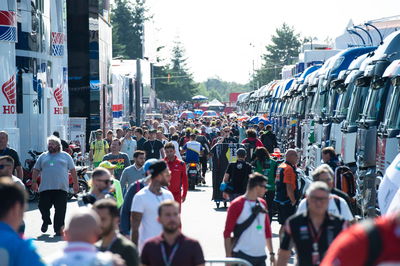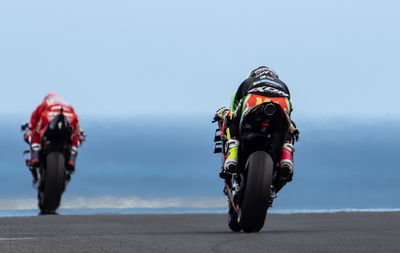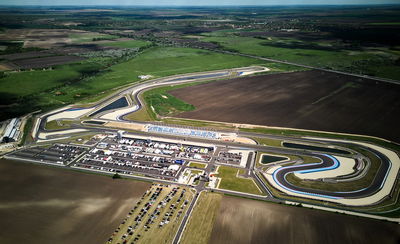MotoGP teams would consider two-day race weekend
The MotoGP calendar will reach a record 20-races next season, with the debut of Finland's KymiRing circuit.
And it won't stop there.
Following the F1 model of more races, the MotoGP calendar is tipped to reach 22 grands prix within the next few years.
Provisional future deals having already been announced with Indonesia, Brazil and Hungary for 2021-2022, with further interest from the likes of Portugal and Vietnam.

The MotoGP calendar will reach a record 20-races next season, with the debut of Finland's KymiRing circuit.
And it won't stop there.
Following the F1 model of more races, the MotoGP calendar is tipped to reach 22 grands prix within the next few years.
Provisional future deals having already been announced with Indonesia, Brazil and Hungary for 2021-2022, with further interest from the likes of Portugal and Vietnam.
So far, extra events have been partially compensated for by cutting down on testing, with both the Valencia and Qatar winter tests removed from the 2021 season.
That will leave only two official tests (Jerez and Sepang) between the end of the 2020 season and opening race of 2021, meaning any further 'time' savings will have to come from somewhere else.
"Of course, 22 races would become quite tough," said Suzuki team manager Davide Brivio. "It's difficult I think also for the riders, to keep the concentration and keep the 'stress' let's say through 22 races. And also for all of us, for you, for everybody that is working here because it's become a really long period.
"When there was the possibility to have 20 races next year, we started a discussion between the teams earlier this year to think about reducing the test sessions. This was just to try to balance a little bit, try to do something to compensate.
"It's not the same thing to cancel a test and to introduce one race, but at least we're trying to reduce the big stress.
"22 races is going to be quite demanding for everybody I think. You can imagine. But that's the way we are going, Formula One just reached 22 [for 2020] and are already talking about 25."
With testing cut to the bone, one new idea is to compress the race weekend track schedule from three days to two.
"Maybe the idea to reduce the race weekend, I think it could be one way. Personally I would consider and evaluate it. I don’t know if it's possible or not but I think it's something that we can think about," Brivio said.
"Let's do 22 races but maybe we compress the schedule into Saturday and Sunday. This can be one way. We've got to find a solution."
The Italian admitted that having too many races is a fortunate problem to have.
"Luckily MotoGP is becoming more-and-more popular. There are a lot of requests to have races, which is positive. We can go and explore in more countries. This is positive and fantastic for everybody. We are in a very good moment from this point of view and let's try to find the best compromise."
Having quipped "I moved from Formula One to do less races!" new Aprilia Racing CEO Massimo Rivola also said he "totally understands Carmelo [Ezpeleta's] view to have more races and less testing. It's good for our sport."
But like Brivio, the former Ferrari F1 sporting director is keen to explore the possibility of a two-day race weekend.
"The idea of a two-day race weekend is not too bad at all. In fact I proposed that ten years ago in F1, but clearly it was refused. To be honest I think we should think about that," he said.
The concept is far from perfect, with not enough daylight hours to squeeze the current multi-class programme into just two days, unless track time is reduced.
"I'm only concerned about the fact that especially for the young riders, they need a bit of track time, so maybe with a different format we could think about that," Rivola said.
"Having Moto3, Moto2 and MotoGP in the same race weekend is beautiful and you can really see the future. This is something we don’t have to lose. I think it's a key to our sport, to see the next generation coming during the race weekend.
"But [the two-day race weekend is] a very valid point and we will start discussing internally."
When 'MotoGP' four-strokes took over from 500cc in 2002, the premier-class race weekend consisted of one free practice and one qualifying session on both Friday and Saturday, followed by warm-up and the race on Sunday.
For 2005, Friday afternoon practice was changed from Qualifying 1 to Free Practice 2, but the overall tally of six track sessions remained unchanged.
However for 2009, in the aftermath of the financial crisis, Friday morning practice was dropped. That left five MotoGP sessions (two free practices, qualifying, warm-up and race) – with all but opening practice taking place on Saturday and Sunday.
Friday morning practice was then reinstated in 2011, with Qualifying split into Free Practice 4, Qualifying 1 and Qualifying 2 from 2013.
Meanwhile, Rivola's rider Aleix Espargaro is one of those that won't be shedding a tear at not having to test at Valencia next November.
"Every rider has their own opinion. I really hate testing!" Espargaro said. "For me, we are here to race.
"I can understand that we have to test and that we need to test. But I prefer to have races and sincerely the test in Valencia, with the cold temperatures and if you have a bike that will change a lot by Qatar, many times it has no meaning.
"So I think it's good, the new calendar that Dorna is doing. I have to say they always ask us in the Safety Commission, so it's nothing new or something that they decided in 24 hours.
"We were talking about this for the last couple of years and I'm more than pleased with that."












